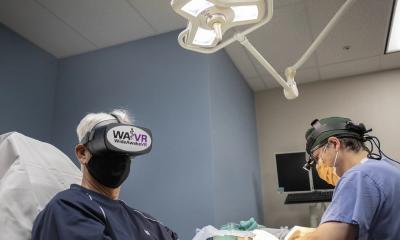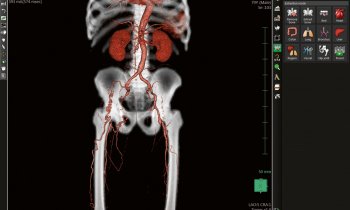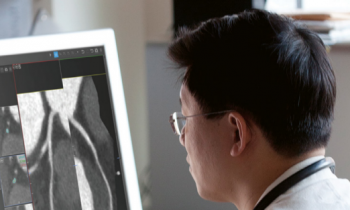
News • Postoperative pain
Hypnosis through virtual reality aids in medical recovery
Anesthesiologists at UT Southwestern Medical Center are helping to explore the use of hypnosis through virtual reality to lessen postoperative pain and anxiety in children.
The European-based pilot study involved 21 young patients and found that virtual reality hypnosis (VRH) reduced anxiety, total postoperative opioid consumption, and vomiting in children after scoliosis surgery. Ten children received VRH support after surgery in addition to usual postoperative pain management, which included patient-controlled analgesics with opioids, while 11 children did not receive VRH.
VRH participation involved one session per day for 20 minutes during the first 72 hours after surgery. The group wore helmets and goggles linked to software developed in France that uses virtual reality hypnosis technology to decrease stress and anxiety. The children got to choose a scenario like a beach, an underwater swim, or walking in the mountains and heard soothing words and music to induce hypnosis.

"To our knowledge, this is the first study to assess the postoperative use of virtual reality hypnosis in children,” says Dr. Girish P. Joshi, Professor of Anesthesiology and Pain Management and one of the study’s investigators. “Our goal is not only to decrease pain but also to decrease opioid use. Morphine is associated with a sedating effect that may prevent patients from eating and walking sooner, so the significant reduction in morphine means they can have a quicker recovery. It’s also been well-documented that reducing preoperative anxiety correlates with reducing postoperative pain.”

The study’s VRH group demonstrated several significant advantages, including:
- Only 20 percent required pain medication (IV morphine), compared with 62.5 percent in the control group.
- 5 percent of the VRH group required anti-anxiety medication, compared with 100 percent in the control group.
- VRH group members were able to sit up and/or walk more quickly after surgery (23 hours compared with 33 hours in the control group).
- The VRH group experienced less vomiting (40 percent vs. 83.3 percent in the control group).
- The average hospital length of stay was 125.5 hours for VRH group members compared with 137.7 hours in the control group.
“We are very encouraged by the initial findings,” Dr. Joshi says. “Our hope is that virtual reality hypnosis will one day be used for most patients undergoing all types of surgeries to reduce postoperative pain and speed recovery.
Source: UT Southwestern Medical Center
18.02.2019











